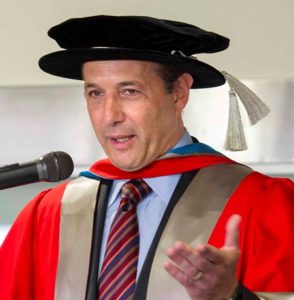 Meeting unparalleled demands for food, water and energy in the Asia Pacific region will require new levels of international co-operation, according to Dr Jeffrey Bleich, former US Ambassador to Australia.
Meeting unparalleled demands for food, water and energy in the Asia Pacific region will require new levels of international co-operation, according to Dr Jeffrey Bleich, former US Ambassador to Australia.
Dr Bleich (pictured) received an honorary doctorate from Flinders University this morning, and this afternoon will deliver a lecture on resource security at Flinders University Victoria Square.
Dr Bleich said that the increasing prosperity of nations across the Asia Pacific is also leading to unprecedented demands on resources, which would have to be met by a combination of technology and regional co-operation.
“It’s not to do with increase in raw numbers of people in the Asia Pacific but the number of people in the middle class, which will go from about 600 million to about 3.2 billion in the next 15 years.”
He said the resulting demands for cars, electricity and higher-input food will stretch resources to the limit.
“No one country can solve this by itself. The big challenge for this region is how countries learn to co-operate on these issues when they’ve never had to co-operate nearly as intensely.
“We’re entering brand new territory.”
Mr Bleich points to history as a cautionary tale.
“The things that have challenged the rise and the sustaining of great civilisations have been these resource issues: either not having enough access to critical resources or fouling the resources that they have, as well as grabs by neighbours because of resources,” he said.
Dr Bleich, however, remains optimistic about the future, pointing out that Thomas Malthus’s 19th century predictions of chaos because of population pressure on scarce resources didn’t eventuate.
“Not only has our population has increased sevenfold, but human consumption has increased; we’re actually doing better at feeding a much bigger population,” Dr Bleich said.
“I’m confident that we can develop the technology to do it: the real issue in this region is that it going to take co-operation that we haven’t seen before.”
Dr Bleich was the US Ambassador to Australia from 2009 to 2013. The honorary doctorate acknowledges his role in shaping current US-Australia relations and his contribution to Flinders through his support of the University’s Washington Internship Program and his encouragement of Flinders’ involvement in the Fulbright program.

